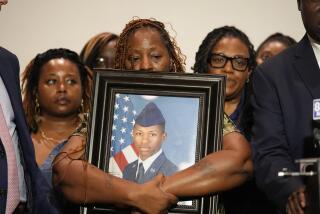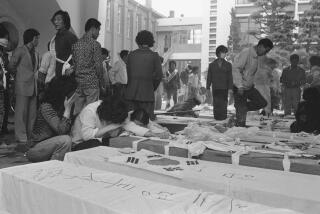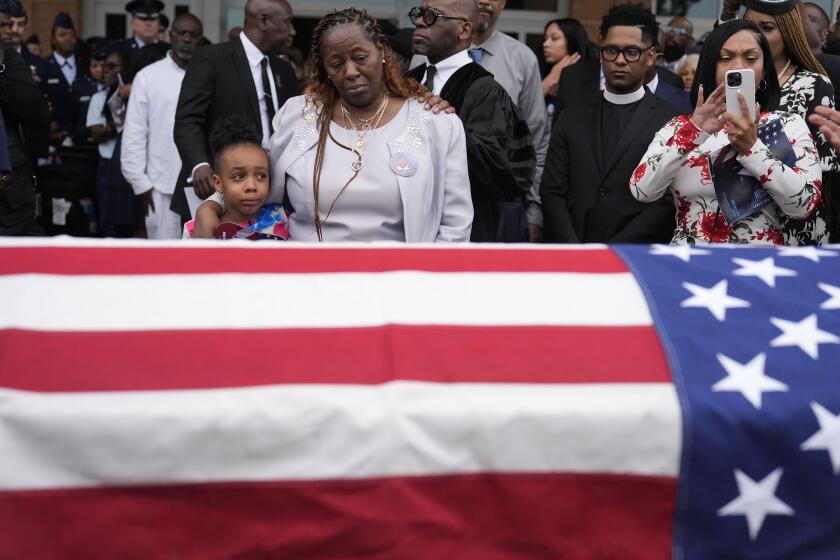Clinton Urges U.N. to Get Tough With Iraq
As a delegation of Iraqi officials headed to New York on Sunday for last-ditch diplomatic efforts in the standoff over U.N. arms inspectors, President Clinton called on the United Nations to take “very strong and unambiguous action” against Baghdad for a growing list of violations and threats.
Speaking on NBC-TV’s “Meet the Press,” Clinton said the United States would not tolerate the “murder” of any American pilot flying a U-2 spy plane over Iraq on behalf of the United Nations. “If you shoot at them, you’ll be making a big mistake,” the president said, directly addressing Iraqi President Saddam Hussein, whose government has threatened to shoot down such flights.
Clinton, whose comments were taped Saturday, said he would not be “bullied” by Hussein and pledged that the U-2 flights would resume. And, after daylight in Baghdad today, the flights did resume with an escort of fighter planes, according to CNN. The flights were suspended last week while three U.N. envoys mediated in Iraq.
Iraq had appealed to the United Nations to delay the flights until after talks today in New York during which the U.N. envoys will present their report on the Baghdad mission. At the United Nations on Sunday, Secretary-General Kofi Annan said the dispute between Iraq and U.N. weapons inspectors “is serious. I don’t think anyone should underestimate it.”
In Baghdad, Hussein was quoted as warning that his country must choose “sacrifice or slavery.” Hussein’s ominous statement, in which he also spoke of “confrontation,” suggested he was preparing Iraqis for punitive action.
Iraq’s state-controlled media reported that air-defense systems were on alert to shoot at “any hostile target that may appear in Iraqi airspace, whatever its kind and nationality,” said Al Thawra, the mouthpiece of the ruling Arab Baath Socialist Party.
As tensions mounted over the weekend, Baghdad called for a compromise centered on three issues: “more balanced” weapons inspection teams; “respect” for Iraq’s sovereignty; and “prospects” for lifting sanctions, according to reports out of the region.
Hussein claimed that Iraq’s actions are “defensive” and “not an attack” against the United States.
But the proposed terms would give Baghdad significant control over both where the U.N. inspectors could go in search of Iraq’s weapons of mass destruction and how long economic sanctions would be in place. They also imply a reduction in the number of Americans on the U.N. inspection teams, which Baghdad says are weighted heavily in favor of U.S. specialists.
All three demands are almost surely unacceptable to the U.S., based on long-standing positions.
Despite a growing number of warnings, Iraq is still looking for possible advantage from the standoff. “We will not retreat from our position unless the world listens to what we have to say and makes changes to the way these arms inspections are continued,” Deputy Prime Minister Tarik Aziz said as he departed for the U.N. talks.
But the real issue may be how long Baghdad can forestall what increasingly appears to be inevitable punitive action. The three U.N. mediators failed to convince Iraq to revoke its expulsion of American inspectors, the initial flash point of the current standoff.
For the seventh consecutive day, Baghdad refused Sunday to allow Americans on four weapons-monitoring teams entry into suspected arms sites, prompting the United Nations once again to cancel the inspections.
International sanctions against Iraq cannot be lifted until the U.N. inspectors certify that Baghdad has complied with U.N. resolutions calling for the elimination of Iraq’s weapons of mass destruction.
Several Clinton administration officials refused to speculate on exactly what will happen if Iraq continues to refuse to cooperate with the inspectors.
“I don’t want to rule anything in or out,” Clinton said in his televised interview. “It’s very important that the president maintain all options and signal none.” But he noted that Hussein needs to understand that his failure to comply is “serious business.”
National Security Advisor Samuel R. “Sandy” Berger, speaking on CNN’s “Late Edition,” warned that any attack on the U-2 flights “would not only be an attack on the plane, it would be an attack on the international community.” Pressed to disclose whether the United States would retaliate, he said Iraq would face “serious consequences.”
Berger indicated that a compromise on the nationality of U.N. inspectors is not negotiable. “That’s like the bank robber choosing who are the police,” he said.
Labeling Hussein a “congenital liar,” Secretary of State Madeleine Albright said on CBS-TV’s “Face the Nation” that, if necessary, the U.S. is prepared to act alone.
Speaking for Republicans, Senate Majority Leader Trent Lott (R-Miss.) said Congress will back unilateral military action if the White House decides to act without U.N. support. The administration can count on support in a “very bipartisan way,” he said on “Fox News Sunday.”
But any attack, Lott added, should not be a “pinprick.”
British Prime Minister Tony Blair wrote Clinton over the weekend to affirm London’s “unshakable” support. “I have no doubt that, as in the past, we must stand absolutely firm and absolutely together . . . against a still dangerous dictator,” Blair wrote to Clinton.
More to Read
Start your day right
Sign up for Essential California for news, features and recommendations from the L.A. Times and beyond in your inbox six days a week.
You may occasionally receive promotional content from the Los Angeles Times.






